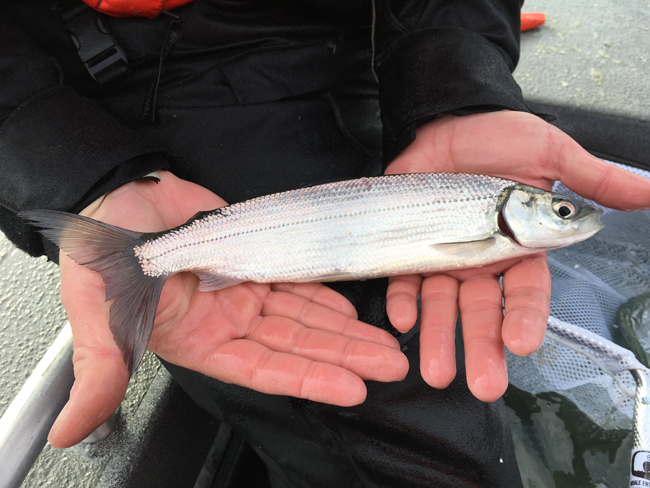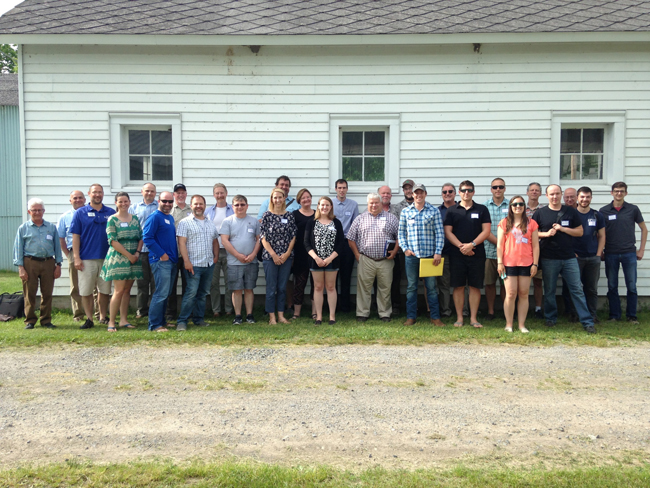
Restoring Cisco populations in Lake Ontario is the focus of an international collaborative effort. Credit: Ellen George.
Contacts:
Jesse M. Lepak, Ph.D., New York Sea Grant's Fisheries and Ecosystem Specialist, P: 315-312-3042, E: jml78@cornell.edu
Kara Lynn Dunn, NYSG's Great Lakes Freelance Publicist, P: 315-465-7578, E: karalynn@gisco.net
Oswego, NY, February 25, 2019 - New York Sea Grant, the Cornell University Department of Natural Resources and The Nature Conservancy have published a summary report for a workshop on “Identifying Research Priorities for Cisco in Lake Ontario.” More than 30 local, state, and international experts participated in the workshop.
The report is available here (pdf), along with a separate appendix (pdf).
“Efforts to increase native Cisco populations in Lake Ontario will support a more diverse forage base for predators including salmon and trout that draw significant numbers of anglers to Lake Ontario,” notes New York Sea Grant Fisheries and Ecosystem Health Specialist Jesse M. Lepak, Ph.D., Oswego, N.Y.
The workshop participants identified critical Cisco research priorities, including the need to:
- develop fast, accurate, affordable, and field-ready Cisco identification techniques to differentiate the whitefishes that include Cisco;
- identify factors, such as weather and predation, that influence Cisco reproductive success; and
- develop a collaborative Lake Ontario-wide assessment strategy for Cisco.
In 2017, fisheries scientists with the USGS, Cornell University Department of Natural Resources, The Nature Conservancy, and the New York State Department of Environmental Conservation published their observations from 2014 that confirmed Cisco spawning in Chaumont Bay in, Jefferson County, NY, suspected as one of the last remaining spawning populations of Cisco in Lake Ontario.

More than 30 local, state and Canadian fisheries experts at a Cisco workshop facilitated by New York Sea Grant. Credit: Courtesy of Cornell Biological Field Station.
More Info: New York Sea Grant
New York Sea Grant (NYSG), a cooperative program of Cornell University
and the State University of New York (SUNY), is one of 33 university-based
programs under the National Oceanic and Atmospheric Administration’s
National Sea Grant College Program.
Since 1971, NYSG has represented a statewide network of integrated
research, education and extension services promoting coastal community
economic vitality, environmental sustainability and citizen awareness
and understanding about the State’s marine and Great Lakes resources.
Through NYSG’s efforts, the combined talents of university scientists
and extension specialists help develop and transfer science-based
information to many coastal user groups—businesses and industries,
federal, state and local government decision-makers and agency managers,
educators, the media and the interested public.
The program maintains Great Lakes offices at Cornell University, SUNY
Buffalo, SUNY Oswego and the Wayne County Cooperative Extension office
in Newark. In the State's marine waters, NYSG has offices at Stony Brook
University in Long Island, Brooklyn College and Cornell Cooperative
Extension in NYC and Kingston in the Hudson Valley.
For updates on Sea Grant activities: www.nyseagrant.org has RSS, Facebook, Twitter, and YouTube links. NYSG offers a free e-list sign up via www.nyseagrant.org/nycoastlines for its flagship publication, NY Coastlines/Currents, which is published quarterly. Our program also produces an occasional e-newsletter,"NOAA Sea Grant's Social Media Review," via its blog, www.nyseagrant.org/blog.